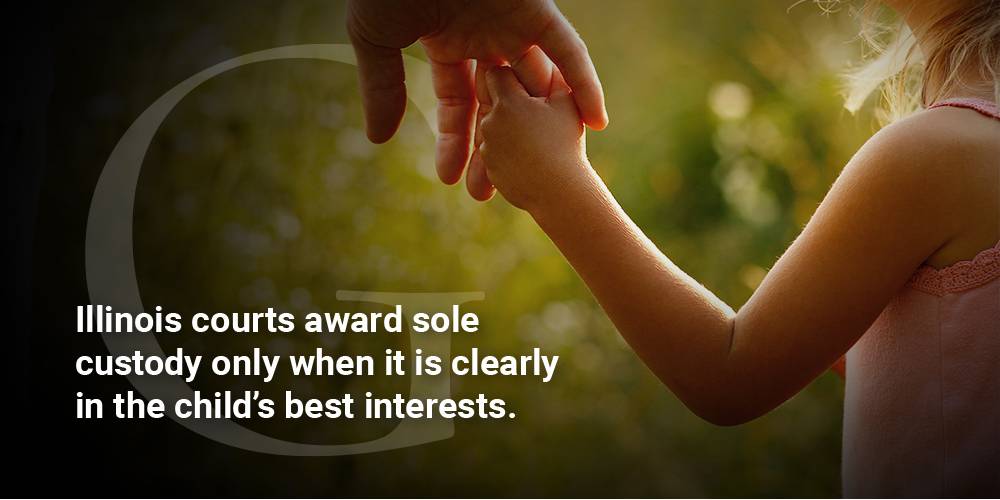What is Sole Custody and is it Possible in Illinois?
 Parents facing divorce or separation in Illinois hear terms like "custody," "parenting time," and "decision-making responsibilities." These phrases carry enormous weight, because they determine how a child will be raised and how much influence each parent will have in that process. One question that parents often have is whether sole custody is possible in Illinois and, if so, what it means in practice.
Parents facing divorce or separation in Illinois hear terms like "custody," "parenting time," and "decision-making responsibilities." These phrases carry enormous weight, because they determine how a child will be raised and how much influence each parent will have in that process. One question that parents often have is whether sole custody is possible in Illinois and, if so, what it means in practice.
As of September 2025, Illinois family law continues to use the relatively new term of "allocation of parental responsibilities" in the Illinois Marriage and Dissolution of Marriage Act (750 ILCS 5/600). While the word "custody" is still used in everyday conversation, Illinois law now divides this larger topic into two key categories: parenting time and decision-making. Sole custody is possible, but it looks different under modern law than many parents expect.
If you are getting divorced and are hoping to be given full custody over your children, you should meet with our St. Charles, IL child custody lawyers. We can explain the process, help you set realistic negotiating positions, and put together a compelling argument for your perspective in your divorce.
What Does Sole Custody Mean in Illinois?
In everyday language, sole custody means one parent has primary control over raising the child. In Illinois legal terms, this can take two different forms:
-
Sole decision-making responsibility: One parent is granted the authority to make all significant decisions about the child’s education, health care, extracurricular activities, and religious upbringing.
-
Majority or primary parenting time: The child primarily lives with one parent, while the other has limited, supervised, or no parenting time.
When parents talk about "sole custody," they often mean having the child live primarily with them and holding all decision-making authority. Illinois courts can grant this arrangement, but it is not the default arrangement and it is increasingly less common.
When Do Illinois Courts Grant Sole Custody?
Sole custody is considered a serious step because it puts all responsibility for a child with one parent. Courts throughout Illinois will only award sole custody when it is clear that joint decision-making or shared parenting time would not serve the child’s best interests.
One common circumstance where sole custody may be granted is when one parent has a history of domestic violence, abuse, or neglect towards either the other parent or the child. Other common reasons include a parent’s substance abuse or untreated mental health issues, a complete breakdown in communication between the parents that makes joint decision-making impossible, or a serious and consistent unwillingness by one parent to act in the child’s best interests.
Even in these cases, judges try to protect the child’s relationship with both parents through some type of parenting time arrangement, unless that would be harmful to the child.
What Does the "Best Interests of the Child" Mean?
When deciding whether to grant sole custody, judges apply the "best interests of the child" standard. This can sound arbitrary, but it involves many important points of consideration, including:
-
What the child wants, depending on the child’s age and maturity.
-
The child’s adjustment to home, school, and community.
-
The mental and physical health of both parents.
-
Each parent’s past involvement in caregiving and decision-making.
-
The parents’ ability to cooperate with each other.
-
Any evidence of abuse, neglect, or violence.
No single factor controls the outcome. The judge will try to get a sense of the entire picture to decide whether giving one parent sole custody will protect a child’s well-being.
Is Sole Custody Permanent?
Illinois law recognizes that family circumstances change. Parenting plans and custody orders can be changed if there is a substantial change in circumstances and, again, if the modification would serve the child’s best interests. For example, if a parent previously struggled with substance abuse but later demonstrates stability and responsibility, the court may reconsider custody arrangements.
In Kane County, parents who want to change a custody order need to go back to the same court that issued the original order. Judges will closely examine whether the change truly improves the child’s situation before making a decision.
What Rights Does a Noncustodial Parent Have?
Even if one parent is granted sole custody, the other parent usually still has some rights. Parenting time may be limited, supervised, or structured around the child’s needs, but Illinois law favors maintaining a meaningful relationship between the child and both parents whenever possible.
Noncustodial parents also have the obligation to support their child financially. Child support orders are separate from custody decisions. Even if the parent paying child support never sees the child, child support payments must still be made.

Alternatives to Sole Custody
While sole custody is possible, many families find that joint allocation of responsibilities works better, as long as both parents can talk to each other about parenting issues without traumatizing the kids. Because parents often feel strongly about different parts of a child’s upbringing, judges will sometimes encourage parents to make detailed parenting plans that divide decision-making authority by topic.
For example, one parent may make medical decisions while both share education decisions; one parent might be in charge of the child’s religious involvement while the other decides what extracurricular activities the child will do. This approach allows children to benefit from the involvement of both parents while reducing conflict.
In situations where there are real questions about the child’s safety with one parent, supervised visitation may be a good option. With supervised visitation, the child and parent meet in a place decided on ahead of time. This might be a visitation center, one parent’s home, or a public location, but the key part of supervised visitation is that the child and the parent are not alone together. Supervised visitation typically lasts until the parent of concern can prove he or she is not a threat to the child’s best interests.
Contact a Kane County, IL Child Custody Lawyer
If you are considering trying to get sole custody, you do not need to face the process alone. A St. Charles, IL family law attorney at Goostree Law Group can explain your rights, help you understand whether sole custody is realistic in your case, and build a strategy that serves your child’s best interests. With decades of combined experience, our respected firm has guided countless families through custody issues. Call 630-584-4800 today to schedule your free consultation.












